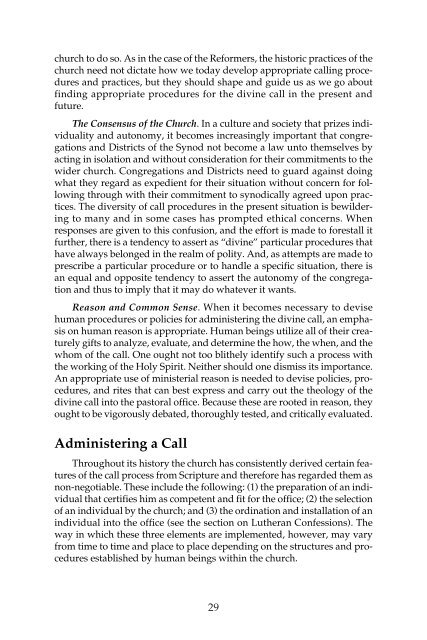45930 Divine Call CTCR final - The Lutheran Church—Missouri Synod
45930 Divine Call CTCR final - The Lutheran Church—Missouri Synod
45930 Divine Call CTCR final - The Lutheran Church—Missouri Synod
You also want an ePaper? Increase the reach of your titles
YUMPU automatically turns print PDFs into web optimized ePapers that Google loves.
church to do so. As in the case of the Reformers, the historic practices of the<br />
church need not dictate how we today develop appropriate calling procedures<br />
and practices, but they should shape and guide us as we go about<br />
finding appropriate procedures for the divine call in the present and<br />
future.<br />
<strong>The</strong> Consensus of the Church. In a culture and society that prizes individuality<br />
and autonomy, it becomes increasingly important that congregations<br />
and Districts of the <strong>Synod</strong> not become a law unto themselves by<br />
acting in isolation and without consideration for their commitments to the<br />
wider church. Congregations and Districts need to guard against doing<br />
what they regard as expedient for their situation without concern for following<br />
through with their commitment to synodically agreed upon practices.<br />
<strong>The</strong> diversity of call procedures in the present situation is bewildering<br />
to many and in some cases has prompted ethical concerns. When<br />
responses are given to this confusion, and the effort is made to forestall it<br />
further, there is a tendency to assert as “divine” particular procedures that<br />
have always belonged in the realm of polity. And, as attempts are made to<br />
prescribe a particular procedure or to handle a specific situation, there is<br />
an equal and opposite tendency to assert the autonomy of the congregation<br />
and thus to imply that it may do whatever it wants.<br />
Reason and Common Sense. When it becomes necessary to devise<br />
human procedures or policies for administering the divine call, an emphasis<br />
on human reason is appropriate. Human beings utilize all of their creaturely<br />
gifts to analyze, evaluate, and determine the how, the when, and the<br />
whom of the call. One ought not too blithely identify such a process with<br />
the working of the Holy Spirit. Neither should one dismiss its importance.<br />
An appropriate use of ministerial reason is needed to devise policies, procedures,<br />
and rites that can best express and carry out the theology of the<br />
divine call into the pastoral office. Because these are rooted in reason, they<br />
ought to be vigorously debated, thoroughly tested, and critically evaluated.<br />
Administering a <strong>Call</strong><br />
Throughout its history the church has consistently derived certain features<br />
of the call process from Scripture and therefore has regarded them as<br />
non-negotiable. <strong>The</strong>se include the following: (1) the preparation of an individual<br />
that certifies him as competent and fit for the office; (2) the selection<br />
of an individual by the church; and (3) the ordination and installation of an<br />
individual into the office (see the section on <strong>Lutheran</strong> Confessions). <strong>The</strong><br />
way in which these three elements are implemented, however, may vary<br />
from time to time and place to place depending on the structures and procedures<br />
established by human beings within the church.<br />
29


